

Major Glenn Miller was inducted into the AF Public Affairs Hall of Fame at AFPAA's 2024 Annual Meeting in San Antonio. The video below, provided and narrated by Mr. Dennis Spragg, the curator of the Glenn Miller archives at the University of Colorado, Miller's alma mater, was played at the induction ceremony.
Bandleader and musician Glenn Miller is considered the father of the modern military band. One of the most popular bandleaders in the late 1930s and early 1940s, he inspired the World War II generation with such songs as Moonlight Serenade, In the Mood, Tuxedo Junction, Chattanooga Choo Choo and A String of Pearls.
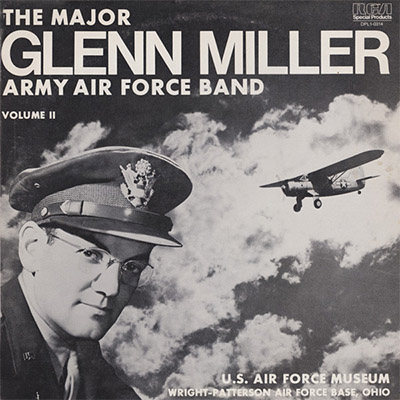
Alton Glenn Miller was born in Clarinda, Iowa, on March 1, 1904,
moving around with his family several times before settling in
Colorado, where Miller graduated from high school in 1921. Music had
quickly become Miller’s passion and he skipped his high school
graduation for a gig in Wyoming. He attended the University of
Colorado in Boulder off and on before dropping out to focus on his
music career. In the late 1920s through the mid-1930s, Miller played
in various bands around the country, working with notable artists such
as the Dorsey Brothers and Benny Goodman — some of the kings of
a new type of music, Big Band jazz. An emerging genre of swing music,
Big Band jazz took its name from the larger bands being formed, which
gave their music a different sound. In 1937, Miller put his first band
together. The band was well-received, even playing at the Roosevelt
Hotel in New Orleans in the summer of 1937. Internal difficulties led
Miller to dissolve the group by the end of 1937, though he quickly
came back with a new band in the summer of 1938.
The new group Miller organized became known as the Glenn Miller
Orchestra. Already well-established by late 1939, Miller’s band
skyrocketed into the limelight when they performed with the highly
popular African American quartet The Ink Spots at the Paramount
Theatre in New York. Following on the success of that performance, the
Orchestra was signed to a reoccurring series on CBS radio, the
“Chesterfield Moonlight Serenade.” The fifteen-minute program ran
three times a week from December 1939 until September 1942. The next
year Miller added an NBC radio program, which meant audiences across
the country could hear the Glenn Miller Orchestra on a radio program
almost every day of the week.
At the peak of his civilian career, Miller decided that he could
better serve those in uniform by putting one on himself. Too old to be
drafted, the 38-year-old Miller volunteered for the Navy, only to be
told that the Navy could not use the bandleader's services. Undaunted,
Miller persuaded the Army to accept him so that he could "put a little
more spring into the feet of our marching men and a little more joy
into their hearts — and be placed in charge of a modernized army
band.” Miller ultimately joined the U.S. Army as a captain. His
mission included forming bands, modernizing military music and
building troop morale.
Reporting for duty on October 7, 1942, Captain Miller was transferred
from the Army to the U.S. Army Air Forces (USAAF) and assigned to
Maxwell Field, Alabama. By 1943, Miller was named the Director of
Bands, Training, for the Army Air Forces Technical Training Command
and moved to the USAAF Basic Training Station #2 in Atlantic City, New
Jersey. As Director of Bands, Miller began to recruit. Any civilian
who wanted to play for him in the Army Air Forces simply had to write
him a letter of intent and give him details on their skills. Upon
enlistment, Miller could request almost any man he wanted and have
them pulled into his unit. Several of the musicians who had played
with Miller in civilian life followed him into uniform and joined his
band again.
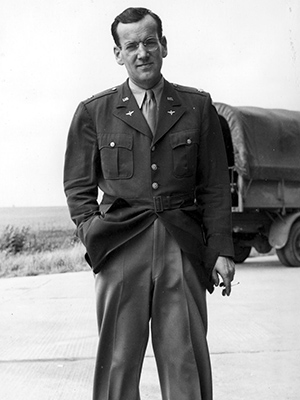
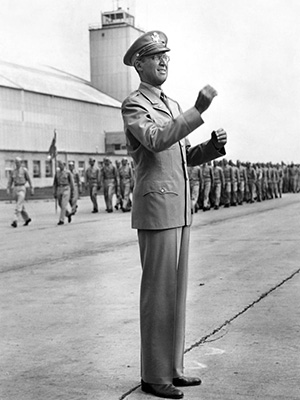
Another move in 1943 took Miller to New York City where he was
assigned to Yale University to set up a radio production unit and
concert orchestra. This Army Air Forces Band was larger than any
Miller had led before joining and he was able to mix smaller elements
into the group which could play dance and jazz numbers, broadening
what his orchestra could offer audiences. Never one to focus on one
outlet at a time, during 1943, Miller and his orchestra toured the
U.S., contributing to Office of War Information recordings by
recording “Uncle Sam Presents” for use by American Forces and “Music
from America,” which targeted foreign audiences. A larger project was
“I Sustain the Wings,” a program of music and sketches detailing Army
Air Forces units, job specialties, and more in hopes of obtaining
recruits. Appearances by the band at bond drives easily netted upwards
of four-million dollars in pledges in a single night. Although Miller
had joined the Army Air Forces and created a new band, he remained as
popular as ever with the civilian population. But Miller was not
satisfied; he wanted to play in person for troops overseas.
Fortunately for Miller, Supreme Allied Commander, General Dwight
Eisenhower had already put the wheels in motion to get Miller to the
European theater. In 1943, Eisenhower ordered a radio network to be
put together for the entertainment of troops awaiting further
deployment in England. There was much about life in Britain that
American GIs found strange, and the radio broadcasts by the British
Broadcasting Corporation (BBC) were at the top of that list. They
craved familiar songs from home, American news, and American sports in
familiar accents with comedy that they understood. The American Forces
Network (AFN) was born out of a need to improve morale and it went
live in the summer of 1943. Filled with familiar news and music from
home, it had an instant effect, improving morale. Eisenhower was
pleased, but wanted more. He wanted Captain Glenn Miller.
Eisenhower sent a letter to General Henry “Hap” Arnold, the Commanding
General of the U.S. Army Air Forces (USAAF), requesting Captain Glenn
Miller, his Army Air Forces Band, and his radio production unit be
transferred to the United Kingdom. Eisenhower wanted Miller’s band to
be the American Band of the Allied Expeditionary Forces (ABAEF).
Miller didn’t hesitate. He had been appealing to take his band to
England. The opportunity was exactly what he wanted.
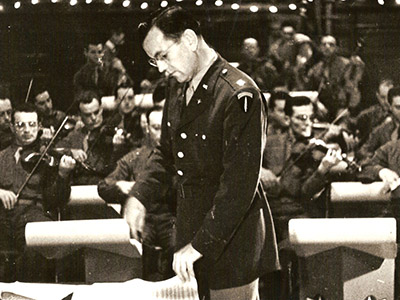
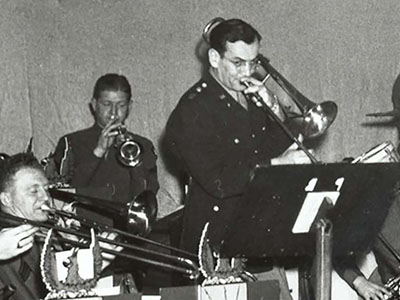
Miller flew to England while his 60 plus member organization took the
slow route on board the RMS Queen Elizabeth, finally arriving in
London in late June 1944. His newly designated American Band of the
AEF (the band was often still referred to as the Major Glenn Miller
Army Air Force Band) started on a grueling schedule. The full
50-member band traveled to London weekly to record broadcasts for the
AFN and BBC. In addition, smaller dance and jazz bands within the
larger orchestra recorded additional programs for broadcast throughout
England. These programs brought the band to the attention of the
British public, who quickly became avid listeners and huge fans.
On top of their heavy recording schedule, the band toured England,
performing at Army Air Forces air bases around the country where they
were met with wild cheering and great enthusiasm. Lieutenant General
Jimmy Doolittle, Commanding Officer, Eighth Air Force, said of the
band, “Next to a letter from home, Capt. Miller, your organization is
the greatest morale booster in the ETO.” With the band’s continuing
success, Miller was promoted to Major, receiving official word of the
promotion in August 1944.
Paris fell to the Allies in August, and Miller was eager to get to the
continent where he could play for GIs on leave in the city. But the
AFN and BBC didn’t want to let him go. They relied heavily upon
constant recordings from his band to fill their programming and the
logistics of recording in Paris and returning the recordings to London
were complicated. To gain their approval, Miller agreed to a brutal
recording schedule. From November 20 to December 12, the ABAEF
recorded an astounding 84 hours of programming. He was cleared to go,
and the announcement was made — Glenn Miller was headed to
Paris.
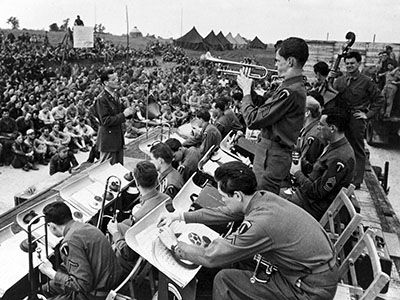
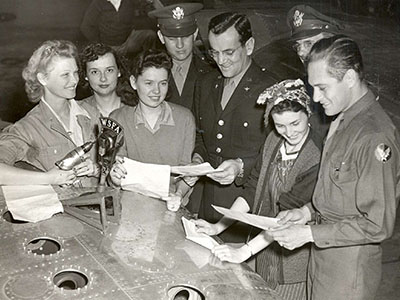
With a Christmas Day performance scheduled, Miller was eager to get to
Paris. There had been difficulty coordinating lodgings and other
spaces required for his more than 60-member organization, and he was
ordered to Paris himself to finish the work. Again, Miller faced
difficulty. The weather was terrible — cold and foggy. Regular
transportation flights were canceled, and Miller was getting antsy.
The band was scheduled to fly to Paris on December 16, and Miller had
to arrive before to firm up their plans. On December 15, 1944, Miller
took his manager's place on a flight from Bedford, England to Paris,
where he would be arranging for the band to perform. The pilot took
off despite foggy weather, and the plane disappeared over the English
Channel. Its fate remains a mystery.
Maj. Glenn Miller earned multiple service awards, including
(posthumously) a Bronze Star. According to the medal citation, "Major
Miller, through excellent judgment and professional skill,
conspicuously blended the abilities of the outstanding musicians,
comprising the group into a harmonious orchestra whose noteworthy
contribution to the morale of the Armed Forces has been little less
than sensational."
The Major Glenn Miller Army Air Forces Orchestra's legacy has carried
on with the Airmen of Note, one of six musical ensembles within the
U.S. Air Force Band. Created in 1950, the Airmen of Note consists of
18 active-duty musicians and several vocalists. They continue to play
jazz music for the Air Force community and the general public, often
in World War II uniforms.
Want to get In The Mood and learn more
about Major Miller? Listen to Episode 4 of the
Connection Series: "The Glenn Miller Legacy". Thanks to the U.S. Air Force Band and DVIDS for this tribute to him
and an explanation of why his music remains so compelling. And here's some rare video footage of Miller and the AAF Band at High Wycombe, England in 1944: Part 1 and Part 2.